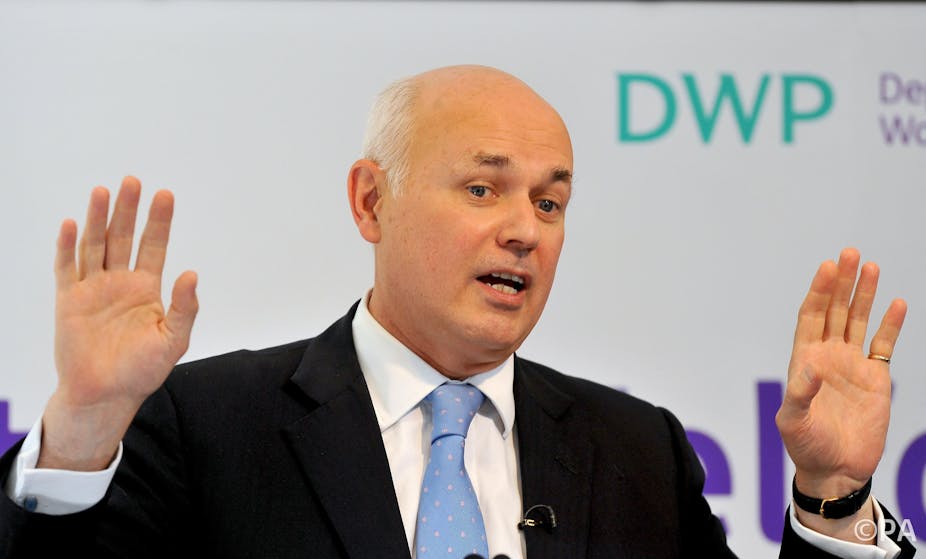The dramatic resignation of Iain Duncan Smith has plunged the Tories into their gravest political crisis in a very long time. In fact, the last time it found itself in this much turmoil was when Duncan Smith was ousted as leader in 2003.
There, in that moment, lie the origins of the current civil war. This isn’t primarily about welfare cuts, Europe or a clash of personalities. This is a battle of ideas that has come to split the Conservative Party. It boils down to the compassionate conservatism championed by Duncan Smith against the economic liberalism defended by chancellor George Osborne.
Duncan Smith was among the rebels who opposed the Maastricht Treaty in 1993. For their efforts to block the closer integration of Europe, party leader John Major famously labelled these rebels “bastards”. The group opposed the EU on the Thatcherite grounds that it was not enough pro-free market.
But following a visit to the deprived housing estate of Easterhouse in Glasgow in 2002, Duncan Smith began to undergo a profound transformation from economic Thatcherism to compassionate conservatism. That year, he acknowledged that: “people too often remember the hurt we [the Tories] caused and the anger they felt” and that: “we believe that the privileges of the few must be turned into the opportunities of the many”.
He was part of a small group that set up the Centre for Social Justice in 2004. The think tank has since established a track record for developing ideas to improve the lot of the poor. Instead of relying on either the central state or the free market, the CSJ has consistently argued for community-based solutions to address the five causes of poverty: family breakdown, lack of education, unemployment, addiction and personal indebtedness.
Change of heart
In government, Duncan Smith has tried to adopt some of the CSJ ideas. He has pushed for early intervention to help families who struggle and encouraging those who can work to return to work. He believes the universal credit would radically simplify the benefits system, even though its introduction has been blighted by terrible IT problems.
Duncan Smith has also publicly supported many measures that went directly against his stated social purpose, including welfare cuts, the bedroom tax and the withdrawal of benefits from people who now rely on food banks. But it is equally true that he and his allies have been saying for some time that deficit reduction has hurt the poor disproportionately while maintaining the privileges of the affluent middle classes and wealthy pensioners.

That’s the main motivation for resigning over the proposed cuts to disability benefits. If the EU referendum was the real reason, Duncan Smith could and probably would have left the government before now. This much is clear from the fact that he remained in the cabinet even after the prime minister announced his underwhelming renegotiated EU membership terms. The fact that he chose not to resign at that stage suggests that Europe was not the final straw.
That said, Duncan Smith will still have to answer why he remained in office after the bedroom tax or the tax credit fiasco, which were fundamentally incompatible with his commitment to compassionate conservatism.
Meanwhile, at Number 11
Since his meteoric rise from new MP in 2001 to chancellor of the exchequer in 2010, George Osborne has stuck to a very different political philosophy. His position is a mix of social and economic modernisation that reflects his metropolitan liberal outlook.
That has put him at odds, not just with the Conservative grassroots, but also with large parts of the country, for whom globalisation has not been an unmitigated success – including many working-class communities that have experienced a drop in wages (exacerbated by low-skilled immigration) and whose local economies are disappearing. Many of them are small “c” conservatives who feel similarly betrayed by the Tories and Labour and have switched to UKIP.
By contrast with his friend Osborne, Cameron shares some of Duncan Smith’s commitment to social reform. As opposition leader he embraced the idea of building a Big Society, which was to be about strengthening civic institutions alongside the state and the market and empowering community-based solutions.
But after the 2008 financial crash, Cameron performed a u-turn and adopted the austerity agenda that dominated his first term as prime minister. To the regret of compassionate conservatives, the Big Society was hollowed out and derided by Thatcherites as garbage.

Following his unexpected victory in the 2015 general election, Cameron renewed his commitment to the social reform agenda. Under the banner of one-nation conservatism, his speeches on domestic politics have focused on social mobility, fighting racism, and working towards equality of opportunity, pursuing what he calls “progressive ends” with “conservative means”.
Even Osborne seemed to get in on the act, announcing in his July 2015 budget the introduction of a national living wage, apprenticeships funded by business and city devolution.
But Osborne has played personal politics with the national budget – and burned his fingers repeatedly, especially with the bedroom tax and cuts to disability benefits. If he wants to stand any chance of being elected Tory leader and even prime minister, he needs to develop a political vision that can command the support of Conservative voters and the wider electorate.
The only way he’ll get a chance to rebuild his reputation is if the country votes to remain in the EU. Thus the key to Osborne’s future lies in No 10. Cameron has to broaden his case for Britain’s membership of the EU beyond economic and national security arguments to include patriotic reasons for staying in. Otherwise the remain campaign will struggle to mobilise enough voters to turn out on June 23. Osborne’s fate now rests with the nation, not his party.

